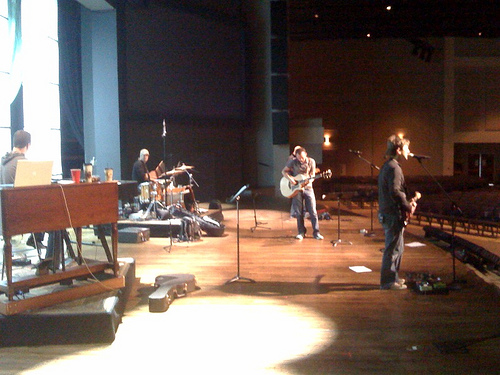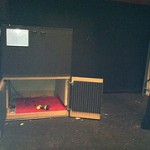
A Day in the Life: Wednesday
I’m starting another series to give a little insight into what my days are like for a typical week. My week runs Sunday through Thursday, but I’m going to start off with Wednesday since the entire week tends to hinge on it. Wednesday is all about rehearsal.
Start of the Day
I start late on Wednesdays and usually get in between 12:30pm and 1pm. The afternoon is focused on rehearsal prep, and I start by making sure my documentation for Sunday is in order. This mainly consists of input lists and stage plots. Most of this stuff gets started on earlier in the week so I’ll save details for those days. On Wednesday I’m doing final checks on things and making sure nothing was added last minute. Sometimes this takes a couple minutes and sometimes it might take me an hour or more if I have to do a lot of shifting of things or finishing up. Sometimes I literally walk from the parking lot to the work room to start printing things out.
I take care of two auditoriums along with our NP Online studio. Each auditorium features their own band and needs three input lists printed: one for FOH, one for Monitor World, and one to use as a patch sheet that will live in the amp room next to the patchbays. The NP Online studio also gets its own input list. In addition, Monitor World gets a stage plot and a monitor console output list that has info on who gets what mix on the desk. I’m hoping to go paperless with all this over the next 12 months, but in the meantime I end up with a big stack of paper.
Rehearsal Setup
Once everything is printed, I start setting up for rehearsal. Some weeks this is a fairly simple process, but most weeks it takes up most of the afternoon. I typically start by dropping off an input list in the studio. Whoever is mixing NP Online sets up the studio so I move quickly from there to monitor world in one of the auditoriums. If I’m going to be mixing that week, I typically start in the opposite auditorium otherwise it’s completely random.
First I clean up any lingering paperwork and remove board tape from the previous week that our volunteers might have forgotten to throw away. Then I label the monitor console. Since our monitor consoles are analog, I do it the old-fashioned way by putting down some tape and labeling inputs; I use 1″ black gaff and a silver Sharpie for this task. Our typical instrumentation stays relatively similar from week to week so it’s usually just a matter of labeling vocalists and adding an instrument here and there. I also label the outputs on the console with the name of the player who will use that mix.
With the console labeled, I move to pinning the stage. Our drum and keyboard risers stay consistent week to week so those generally only need a spot check, but truthfully I’ll usually leave them alone because it’s good practice for our volunteers to solve problems on these during soundcheck if something is out. Most of the stuff I’ll pin revolves around guitars.
In the past, the previous week’s band was usually left setup, but I’m finding that sometimes it’s easier to clear the stage and start from scratch. I tend to make more trips between the amp/equipment room and the stage when I’m adjusting a previous setup, but if I know the stage is clear, I just grab everything I need and pin the stage all at once.
After the stage is pinned, I usually move to the amp room to patch. I start by un-patching everything I know is changing such as the vocal mics. Then I clear out any inputs we won’t be using. Patchbays quickly turn into birds’ nests so I try and keep them as clean as possible week to week because there’s nothing worse than troubleshooting a patchbay when you can’t follow the cable. I completely clear the bay every two or three months just to clean it all up which is also good for the connectors.
After patching I head to FOH. We start with a template on the console every week so I load that and modify from there. While some inputs are pre-dialed a bit such as the house drums, the template is most important for all the output patching. Everything is documented, but it would be a pain to redo every week. If I’m not mixing, I only pull up the template and relabel things and add any inputs as necessary.
Once everything is labeled and patched in the console, I create a Pro Tools session to record rehearsal which has been much simplified thanks to the VENUE Link added in the v2.9 software. This used to take some time and I would miss inputs on occasion. Now it takes maybe 30 seconds, and I never have to worry if I missed anything; if it’s patched on the console, it shows up in Pro Tools. In reality, we could probably wait to do this right before we record because it’s just so fast and easy with VENUE Link.
If I’m mixing that week, the last thing I’ll do is start customizing the FOH console for myself. I’ll move channels to get my layout right and tweak VCA and group assignments. I’ll also pre-load any additional plugins I think I might want to try during rehearsal.
Once I finish the first auditorium, I move to the second and do it all over again. If there’s any time left in the afternoon, I’ll probably check email and work on any other administrative tasks. I might also flip through one of the many trade magazines laying around on my desk and see if there’s anything interesting.
Pre-Rehearsal
Audio call time is 6pm for rehearsal, but our volunteers arrive as early as 5pm sometimes. Band members start trickling in between 5:30-6:30. Our volunteers pull all the vocal mics and in-ears, label them, and change their batteries. They’ll also pre-dial the monitor console and do a full line-check on stage. I’ll try and hang around the stages during this time and bounce between auditoriums to check in with volunteers and chat with band members as they arrive. I’ll also do mic placement checks on guitar amps and drums as the musicians get situated. If I’m mixing that week, I’ll probably head back out to FOH at some point and start pulling things up in the house if musicians are messing around on stage. This gives me a chance to fix anything major before soundcheck. We also typically try and soundcheck the drums at monitors before dinner so I’ll pull them up in the house if I’m out front at that time.
Food is in the greenroom around 6pm so once everything in the room is done I’ll head in there with the rest of the crew. This is more time to hang out with our crew for the week. Around 7pm, the band will listen to all the songs we’re doing for the week followed by a devotion time.
Soundcheck and Rehearsal
Soundcheck typically starts between 7-7:15 and takes on average twenty minutes. Some go faster and on occasion it can take quite a bit longer. After soundcheck the band runs the first song and then checks for any major monitor tweaks. They’ll then typically take one or two stabs at each song and focus on any trouble sections. Once the band feels good and the FOH mix is in the ballpark, we’ll run all the music as if it were Sunday morning while we record it. The recordings are used by production to program lights and video directors to get an idea of what’s going on. Staff and band members will also use the recordings to make sure everything is working and rehearse prior to Sunday.
Post-Rehearsal / Virtual Soundcheck
The band is usually wrapped between 8:30-9pm. Sometimes I might hang out with some of our volunteers after rehearsal, but if I’m mixing I usually use this time to head to the opposite auditorium and listen back with virtual soundcheck. I’ll then work with the FOH engineer in that room to refine the mix. This generally wraps sometime between 10-11pm. The building closes at 11pm, and it’s extremely rare that we’ll stay beyond that because I hate being the one who has to set the alarm.
So that’s a typical Wednesday. If you’ve got any questions about any of this, the comments are now open.


 Previous Post
Previous Post



That is a great idea to have a meal together, creating fellowship and building relationships.
Does the church provide the food? Or do the people split the costs, or bring their own.
We provide dinner.